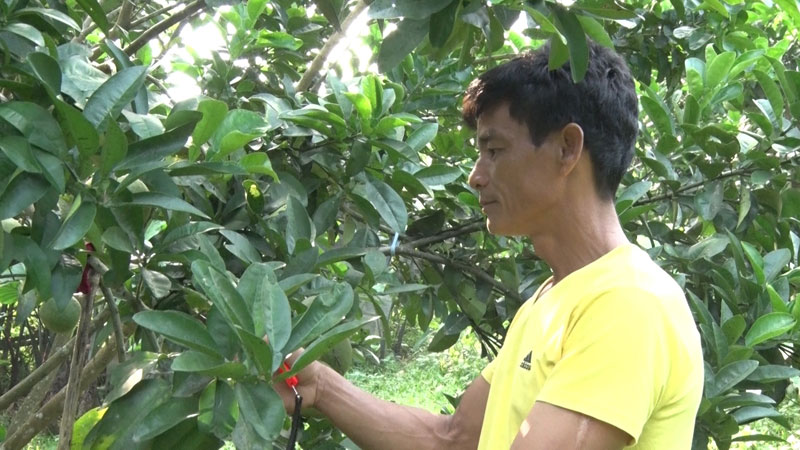
HBO – Developing the economy and increasing locals’ income are always considered a core target and a level for other criteria in the new-style rural area building programme at Thuong Bi commune in Kim Boi district.

The
red pomelo orchard of Bui Van Nghich’s family in Ngheo village enters harvest
time.
Over the past years, Thuong Bi commune has carried out the
shifting of the structure of crops in a serious and thorough manner to create
more jobs for locals, help them increase income and stabilise their lives, and
gradually reduce the number of poor households. Land areas where rice
cultivation produces low yield have been used to grow new kinds of plants which
produce high economic values such as green-skin pomelo, Tan Lac red pomelo or
longan. Many households have initially earned high income from fruit trees, for
example the red pomelo orchards of Bui Van Be and Bui Van Nghich in Ngheo
village.
As of September 2018, the commune had more than 40 hectares of
fruit trees with high productivity, up 10 hectares from the same period in 2017,
of which 29 hectares were in harvest time.
To create a consensus in new-style rural area building, the
locality’s Party committee and authorities have directed local mass
organisations to intensify disseminations to make locals understand more about
the work’s purpose and significance as well as their benefits and
responsibility.
In addition, the commune has appointed officials to each village
to select work items that suit the local conditions and residents’ wish to be
implemented first, while promoting the role of setting example of officials and
Party members in contributing money, materials, land and working days to the
new-style rural area building.
The commune has effectively carried out assistance policies and
mechanisms of the Party, Government and the province to build new-style rural
infrastructure projects. Since 2016, Thuong Bi has built more than 2km of
concrete roads, and over 1.4km of intra-field canals. The local community contributed
to the work nearly 300 million VND worth of cash, land, construction materials
and working days.
With joint efforts of the Party organisation, authorities and
people, as of late September, the commune’s per capita income averaged 14
million VND a year and the poverty rate reduced to 22 percent, while 76 percent
of local households had standard homes, 100 percent of households were
connected to the national grid, and over 70 percent received the cultural
family title. The commune’s political security, and social order and safety
were maintained as well./.
According to data from the Hoa Binh Provincial Party Committee, the industrial production index for the first six months of 2025 is estimated to have increased by 20% compared to the same period last year. This marks the highest year-on-year growth rate for this period since 2020.
In the first six months of 2025, Hoa Binh province’s export turnover was estimated at 1.145 billion USD, marking an 18.11% increase compared to the same period in 2024. Import turnover was estimated at $ 804 million, a 17.15% increase, which helped the province maintain a positive trade balance.
The lives of the ethnic minority farmers in Tan Lac district have gradually improved thanks to the new directions in agricultural production. This is a testament to the collective strength fostered through the professional associations and groups implemented by various levels of the district’s Farmers’ Union.
With the motto the "product quality comes first,” after nearly one year of establishment and operation, Muong village’s Clean Food Agricultural and Commercial Cooperative, located in Cau Hamlet, Hung Son Commune (Kim Boi district), has launched reputable, high-quality agricultural products to the market that are well-received by consumers. The products such as Muong village’s pork sausage, salt-cured chicken, and salt-cured pork hocks have gradually carved out a place in the market and they are on the path to obtaining the OCOP certification.
In the past, the phrase "bumper harvest, rock-bottom prices" was a familiar refrain for Vietnamese farmers engaged in fragmented, small-scale agriculture. But today, a new spirit is emerging across rural areas of Hoa Binh province - one of collaboration, organisation, and collective economic models that provide a stable foundation for production.
Maintaining growing area codes and packing facility codes in accordance with regulations is a mandatory requirement for agricultural products to be eligible for export. Recently, the Department of Agriculture and Environment of Hoa Binh province has intensified technical supervision of designated farming areas and packing facilities to safeguard the "green passport" that enables its products to access international markets.



